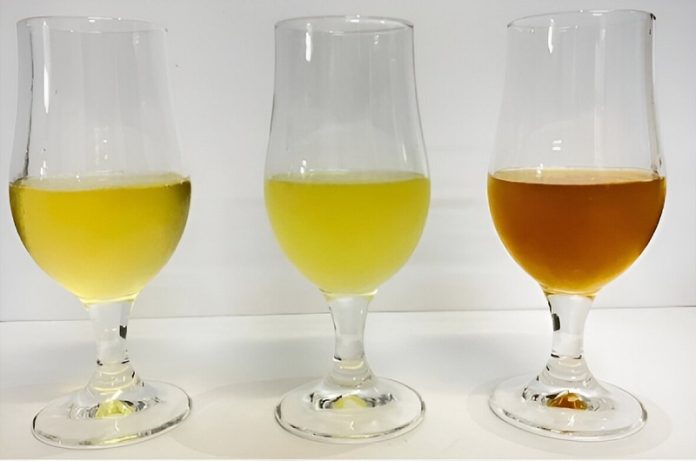
Kombucha, the fizzy and tangy drink made by fermenting tea, has become a popular choice for those seeking a refreshing and health-boosting beverage.
But now, researchers are exploring new possibilities by fermenting fruit juices instead of tea, leading to exciting new flavors and potential health benefits.
In a recent study published in ACS Agricultural Science & Technology, scientists compared traditional kombucha with new brews made from apple and passion fruit juices, and the results are promising.
Kombucha is typically made by fermenting sweetened tea with a SCOBY, a spongy disk of microbes that includes bacteria and yeast.
This process not only creates a fizzy drink but also introduces beneficial bacteria and bioactive compounds like flavonoids, phenolics, and anthocyanins, which are known for their antioxidant and anti-inflammatory properties.
However, few studies have looked into whether other liquids, like fruit juices, could be fermented in a similar way to create kombucha-like beverages with unique flavors and possibly higher levels of antioxidants.
To explore this idea, researchers Socorro Vanesca, Frota Gaban, and their team decided to experiment with apple and passion fruit juices, both known for being rich in antioxidants.
The researchers fermented apple juice, passion fruit juice, and tea separately with a SCOBY for 10 days at room temperature.
They then measured the levels of several important bioactive compounds in each brew. Here’s what they found:
- The fermented apple juice had the highest levels of flavonoids, which are compounds that may provide various health benefits.
- Both the apple juice and kombucha had similar and higher levels of phenolic compounds compared to the passion fruit drink.
- All three beverages contained similar amounts of anthocyanins, which are red-colored antioxidants.
Next, the researchers wanted to see how these new fruit-based drinks would be received by consumers. They asked 12 volunteers to taste each beverage and rate its color, aroma, and flavor. The results were quite interesting:
- The apple juice turned a pleasant amber color, while the passion fruit juice became yellow, and the kombucha remained gold.
- The fermented fruit juices had stronger and fruitier aromas compared to the traditional kombucha.
- In terms of flavor, the apple juice and kombucha were both sweeter and more enjoyable, earning equal votes as the favorite drinks among the volunteers. However, the passion fruit drink was found to be more bitter, which made it less popular.
Given that the fermented apple juice had high levels of beneficial flavonoids and was well-liked by taste testers, the researchers believe it could serve as a successful alternative to traditional tea-based kombucha. They are now planning to explore other fruit juices to see what new flavors and health benefits they can uncover through fermentation.
This study opens up exciting new possibilities for kombucha lovers and those interested in trying new, healthful beverages.
With more research, we could soon see a wider variety of kombucha-like drinks made from different fruits, each offering unique tastes and potential health benefits.
Source: American Chemical Society.



